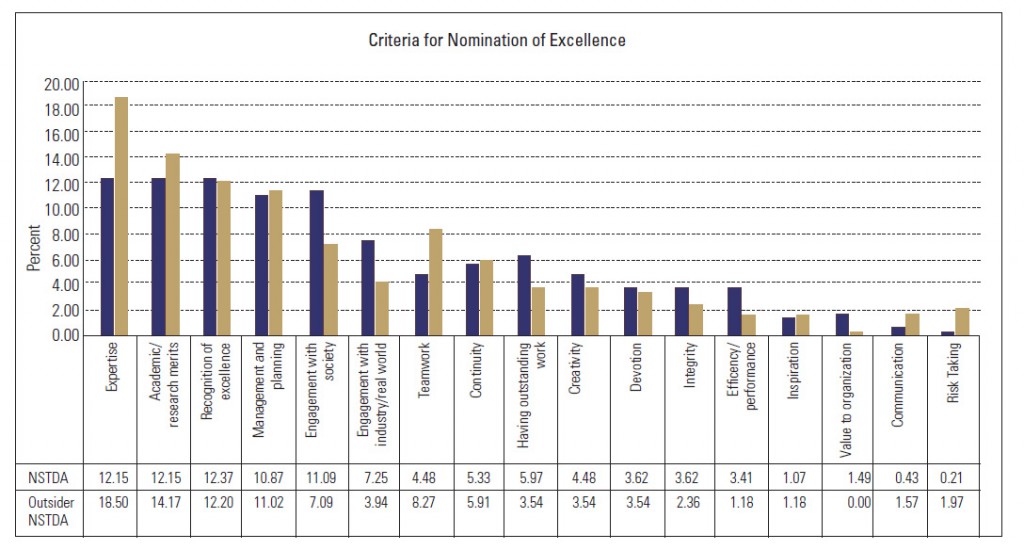
The Scientific Excellence Working Group takes a broad approach towards scientific excellence as excellence in all aspects of the scientific endeavor. “Scientific excellence” in this sense not only includes excellence in scientific research, but also excellence in connecting science to society, in teaching and mentoring scientists, in science management, and in science advice to policy makers, to name only a few.
In this working group, we are interested in defining, describing and measuring scientific excellence and its impact on society. Naturally, there is a key focus on how to evaluate scientific activities and to assess the quantitative and qualitative indicators that are currently used for measuring excellence in science. What is more, we are keen on identifying what kind of environment would be most suitable to unleash curiosity and creativity in science, as well as to foster the development of human potential. We also aim to identify new ways to take into account often implicit personal qualities of a person which are nevertheless vital professionally.
Watch the group’s initial founding statement from 2012 here, and their video for the 2020 GYA e-Annual General Meeting here.
The Scientific Excellence Working Group continues to work together with the InterAcademy Partnership (IAP), the International Science Council (ISC), ALLEA, the JRC, and several European Commission Expert Groups to drive change in the perception and measurement of scientific excellence. These collaborations have led to significant results that are impacting policy on a local, regional as well as global level (see Outcomes section below).
Currently, the group engages in four larger, concrete projects:
The group began work on this first global study of research evaluation practices in 2016, bringing together comparable data sets on a global scale, focusing on criteria to become a full professor. By now, the study collates 238 institutional & government progression evaluation documents spanning 56 countries. This data-informed approach is needed to be able to propose evidence-based recommendations that can improve current evaluation practices and research culture as a whole. The first results and a provisional report of this project was presented at the GYA AGM in 2018.
The final report titled “Regional and institutional trends in assessment for academic promotion” was published in Nature in January 2025.
CoARA (Coalition for Advancing Research Assessment)
Led by the group, the GYA has joined the global coalition for reforming research assessment (CoARA), and has become an active participant in this initiative. As a member of CoARA, in 2023/24, the group will participate in several CoARA working groups, be represented in the CoARA steering committee, and organize the dissemination of CoARA beyond Europe.
In May 2023, the GYA-IAP-ISC synthesis paper on the Future of Research Evaluation was published, to which group co-lead Carlo D’Ippoliti and GYA alumna Shaheen Motala-Timol had contributed as members of the Scoping Group together with IAP and ISC representatives. In 2023/24, the group will engage in follow-up projects and dissemination activities.
In 2023/24, the group will collaborate with the GYA Membership Selection Committee to implement alternative excellence assessment criteria.
The group will continue to be part of the United2Act group to address the collective challenge of paper mills in scholarly publishing. Group member Stefania Mondello will continue to be involved in working group 2 on Improving post-publication corrections; she will also serve as a Vice Chair of the U2A Steering Group. Five United2Act working groups will develop and execute plans to deliver the actions in the statement around the key areas of education and awareness, improve post-publication corrections, research paper mills, enable the development of trust markers, and continue to bring together the many voices in this area through joint projects and initiatives.
In March 2025, the group’s grant application “Empowering Young Academies to Investigate and Re-think Research Assessments Practices for Equity and Inclusion in Africa,” was accepted for funding by the InterAcademy Partnership (IAP).
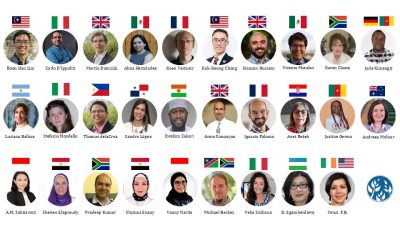
In January 2025, members from this group published an article on Regional and institutional trends in assessment for academic promotion in Nature. Based on many years of researching a global analysis, the article examines the criteria used to measure success in academia. The authors find that publication and citation metrics are not uncommon, but that mentoring, administrative responsibilities, as well as contributions to the field or scientific community frequently play a role as well. Read more here.
In November 2024, at the World Science Forum in Budapest, Hungary, the GYA collaborated with the Coalition for Advancing Research Assessment (CoARA) on a thematic session exploring world regional perspectives on reforming research assessment. You can read more here.
In November 2024, group co-lead Luisa Diele Viegas, together with group members and with members from several other GYA working groups, jointly published a statement on “Young researchers and scholars’ proposals for action for a sustainable present and future”. GYA Alumnus Renard Siew presented the statement during the “Climate Science: key take aways in 2024” event co-organized by the International Science Council (ISC) and the Karlsruhe Institute of Technology (KIT) on 12 November 2024.
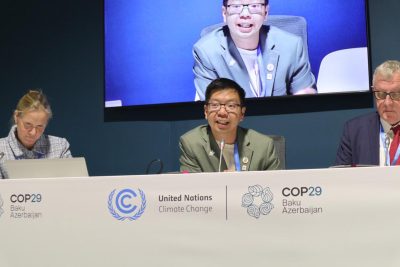
In late May 2024, the GYA together with IAP and ISC produced a paper on “Snapshots of reform – Researcher Evaluation within Science Organizations“. The paper was authored by CultureBase, and working group members were part of the joint project group. The publication builds on previous joint work in 2023.
In May 2024, group members co-organised a workshop on “Reforming Research Assessment to Foster an Open and Socially Responsive Research Culture” jointly with the Coalition for Advancing Research Assessment (CoARA) as well as with the GYA working groups on Open Science and on Trust in (Young) Scientists. The joint session was part of the GYA Annual General Meeting in Washington DC, USA. You can watch the workshop recording here.
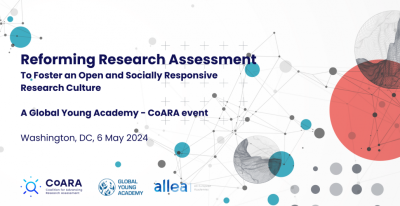
Earlier in May 2024, group co-lead Encieh Erfani and group member Edmond Sanganyado co-organised a session with the Comité Intersectoriel Étudiant (CIE) titled “Towards a Global Definition of Excellence in Research”at the International Network for Governmental Science Advice (INGSA) Conference in Kigali, Rwanda. Their session aimed to explore good practices implemented by funding, research, and policy institutions to reward policy engagement and redefine research excellence. A full report and video are available here.
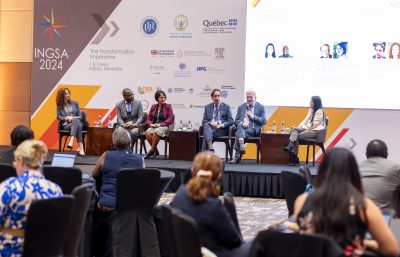
In December 2023, group member Luciana Balboa was elected to the CoARA Steering Board. During 2023, former group co-lead Yensi Flores Bueso had been a board member. As a mid-career researcher working in Argentina and a member of the GYA, Luciana is devoted to promoting open science and improving the incentive systems, and especially to raising awareness of their impact on the careers of young researchers. She sees CoARA as a powerful platform to drive necessary change.
Further, the GYA 2023 International Conference “Technological Innovations for Discovering Solutions to the World’s Greatest Current Challenges” in Kigali, Rwanda, featured the session “Scientific Publishing: A global perspective from early-career researchers on open access dissemination of scientific discovery & data sharing”, during which open access publishers such as PLOS, eLife, and Nature were discussed alongside ORE (June 2023).
At the end of 2023, the GYA signed a United2Act Consensus Statement on the problem of paper mills. The statement outlines five key areas of action against the impact of paper mills on the integrity of academic research and publishing. GYA Alumna Plus and member of the working group Stefania Mondello (University of Messina, Italy) was part of the group of authors.
In May 2023, the GYA-IAP-ISC synthesis paper on the Future of Research Evaluation was published, to which group co-leads and members had contributed at various stages. Co-lead Carlo D’Ippoliti and alumna Shaheen Motala-Timol had served on the Scoping Group with IAP and ISC representatives to produce the report.
In May 2023, group member Stefania Mondello (University of Messina, Italy) spoke at the UNITED2ACT Summit meeting on the collective challenge of paper mills in scholarly publishing, which was supported by COPE, the Committee on Publication Ethics, and STM, the International Association of Scientific Technical and Medical Publishers. Stefania spoke on the issue of paper mills from an Italian academic perspective and how they negatively affect the career selection process, and destroy trust in science. As a way forward, Stefania urged national and international entities, funding agencies, and institutions to take responsibility and create relevant monitoring bodies, and for scientists to develop a sense of research consciousness and resilience.
In January 2023, group co-lead Yensi Flores Bueso attended the first in-person meeting of the CoARA steering board in Brussels, Belgium. During the meeting, several decisions about CoARA’s short, medium and long-term goals were made, and the group’s way of organising its work were defined. Furthermore, the internationalisation strategy of CoARA was discussed, and Yensi will be part of a subgroup for the internationalisation strategy going forward.
At the recent CoARA launch, GYA member and co-lead of the Scientific Excellence Working Group, Yensi Flores Bueso (University College Cork, Ireland)was selected to the Steering Committee of CoARA, as a GYA nominee. Read more about CoARA and the GYA here.
In November, group members Stefania Mondello and Pradeep Kumar contributed to the second joint event by the GYA with ALLEA, the European Federation of Academies of Sciences and Humanities, and STM Publishers. The online webinar on ‘IDEA (Inclusion, Diversity, Equity and Accessibility) in scholarly peer-review’ examineed ways to expand Inclusion, Diversity, Equity and Accessibility in scholarly peer review. A report can be found here.
In November 2022, group members organised an interactive panel session at The Trielennial Conference of the InterAcademy Partnership (IAP) and the Worldwide Meeting of Young Academies (video link forthcoming).
In September, group co-leads Carlo D’Ippoliti and Yensi Flores Bueso as well as group member Pradeep Kumar presented the activities of the Scientific Excellence group at the GYA online event “Young and Global – A perspective on today’s challenges in science” at the Science Summit of the United Nations General Assembly (UNGA77). In their presentation, they considered how to reinterpret “Scientific Excellence” and how to gear research evaluation towards meeting the goals of a more inclusive, impactful, and open science research culture. Group member Robert Robert Lepenies explained the concept of the Sasha Kagansky Interdisciplinary Grant. Read more about the session and watch the full presentation here.
In September 2022, the GYA was part of a group of organisation to issue joint statement on EU Council conclusions on research assessment and open science.
The InterAcademy Partnership, the GYA, and the International Science Council have created a scoping group on research assessment, to look into possible initiatives to be conducted together. The scoping group produced a menu of alternatives and are deciding on which activities to start.
Furthermore, the group provided feedback to the European Comission as part of their stakeholder consultation on problems with research evaluation and its conflicts with open science. These contributed to their scoping report, which proposes an alliance within the research community, based on an MoU.
In December, group member Boon Han Lim (Malaysia) presented the interim results of the “A Global View of Institutional Promotion Criteria for Professorship” project at the Young Korean Academy of Science and Technology event on “Measures to improve university faculty evaluation system”.
In November, group members participated in a joint online workshop with ALLEA, on “Research Assessment“. A brief workshop report can be read here.
In October 2018, the report from the 2016 workshop on “Publishing models, assessment, and open science” was published, detailing the results of the workshop, which include a framework of questions and a set of concrete recommendations.
In May 2018, group members Laura Fierce (USA) and Koen Vermeir (France) presented the results of a survey on the “Study on Reproducibility and Replicability in Science and Engineering” in Washington, DC, by invitation of the US National Academies of Sciences, Engineering, and Medicine. A report which provides a set of comments and recommendations on replicability, based on GYA members’ input and on their personal expertise, entitled “Young Scientist Perspectives on Replicability and Reproducibility in Science and Engineering” was forthcoming.
Throughout 2017 and 2018, the group was working on a project on “Incorporating Intangible Information for Assessment Optimisation”. The idea arose from discussions at the 2017 GYA Annual General Meeting within the working group and was preliminary implemented in 2018. The aim of the activity was to initiate a new project for identifying novel factors which reflect the implicit personal qualities of a person which are yet vital professionally. Read more here.
Participation in “Policy impact of knowledge and knowledge organisations: From understanding impact towards measuring it”, June 2017 (Koen Vermeir)
On a request by ALLEA (ALL European Academies) we gave expert feedback on “The European Code of Conduct for Research Integrity – Revised Edition”, published in 2017. For the factsheet by the European Commission on this document, see: Factsheet on the new European Code of Conduct for Research Integrity. (Martin Dominik, Robert Lepenies, Koen Vermeir)
In 2016, the Working Group submitted a well-received expert opinion for the Open Science Policy Platform of the European Commission report on “Next-generation metrics: Responsible metrics and evaluation for open science”, published in 2017.
Group member Koen Vermeir participated in “Open access and research evaluation: towards a new ecosystem”, Toulouse, in October.
In May 2016, group members organised a workshop on “Publishing models, assessment, and open science” in Eindhoven, The Netherlands, as a side event to the GYA Annual General Meeting. A brief workshop report was published in October 2018.
In 2015, the group was invited to present the perspective of young scientists around the world on “Rewards, careers, and integrity” in a panel discussion “Research assessment and quality in science: Perspectives from international science and policy organisations” convened by ICSU as part of the “4th World Conference on Research Integrity”, held in Rio de Janeiro, Brazil, from 31 May to 3 June 2015. As a result of a critical analysis by the WG, concrete recommendations for implementation both in the short and long term were brought forward, embracing the link between integrity, transparency, openness, and reproducibility, while warning about pressures that young scientists are facing, and pointing to the effect of reward systems on brain drain.
Martin Dominik participated in “The Future of Scholarly Scientific Communication”, The Royal Society, London, in April.
Editorial in “Future of Medical Education Journal” on “Science, Education, and the World’s Future” by Bruce Alberts (FMEJ 2, 2, 2012), soliciting views on “How could young scientists unleash curiosity and creativity to support excellence in science education?“ (Reza Afshari, Marc Creus, Rob Jenkins)
The group also produced a video on “Unleashing Creativity”; see here.